
Posts Tagged ‘peace’
War and famine
War is not just a dispute over markets and measuring “ideals”,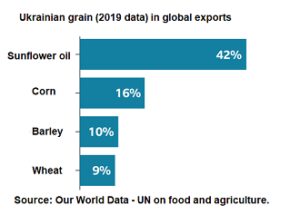 it is above all an atrocity on a scale, if murder is reprehensible why wouldn’t it be a war? during the Serbia/Bosnia war I asked a Serbian activist why she wanted to destroy Bosnia, she told me that they were historical factors that would be difficult to explain, but she said that her country was a “victim” of bombings that had no justification.
it is above all an atrocity on a scale, if murder is reprehensible why wouldn’t it be a war? during the Serbia/Bosnia war I asked a Serbian activist why she wanted to destroy Bosnia, she told me that they were historical factors that would be difficult to explain, but she said that her country was a “victim” of bombings that had no justification.
Such is hatred, intolerance and the absence of dialogue, often concealed with docile words to win public opinion, but every war has as its principle some atrocity, some unjustifiable hatred and some cultural intolerance (it can be of many types), not there is no other way to go back other than repentance (on both sides of course) and acknowledging that they chose the worst way, of course, and then sitting down at the table.
One of the consequences, already inevitable, even if there is an agreement for Ukraine’s grain exports, will be the lack of grains on the world market, as shown in the chart above, the country at war is responsible for 42% of sunflower oil in global exports. , 16% of corn, 10% of barley and 9% of wheat (2019 data, see graph) as Russia exports fertilizer and gas to Europe.
There was an agreement mediated by Turkey, but due to the war it is a fact that part of the production was lost and the price of food has already risen worldwide, the current crop will be exported, but little or nothing can be said about future crops, good part of the population left Ukraine, including in rural areas.
It is difficult for a process of regression, apparently throughout the world the confrontation and cultural and social hatred has spread, even among those who should proclaim peace.
Last week we explained the importance of friendship and empathy between men for a true spirituality, which can help civilization in this difficult process.
There is only one way, to change the climate of empathy, peace and solidarity among people, so that politicians and leaders who grow up around hatred may lose ground.
Plague, War and Famine
This vicious circle seems to perpetuate itself in history, and the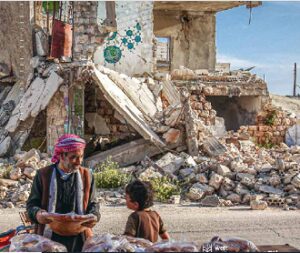 recent data and provocations of the war in Europe not only frighten, but cause a justifiable fear when it is observed that all over the world there are “fans” on both sides, and it is not a game , but a great genocide like any other war, but of greater proportions because it can involve the greatest world powers.
recent data and provocations of the war in Europe not only frighten, but cause a justifiable fear when it is observed that all over the world there are “fans” on both sides, and it is not a game , but a great genocide like any other war, but of greater proportions because it can involve the greatest world powers.
The generation that witnessed the horrors of the first two wars no longer remembers it, counting from the start date, the assassination of Duke Franz Ferdinand in 1914, by a Serbian nationalist and which is considered the trigger of the first war.
What preceded it was a period of European politics from 871 to 1914 called “Paz Armada”, where there is an intensification of disputes over markets, colonial territories and a vision of predominance in European geopolitics, where the Austrian Empire stood out. Hungarian to which Francisco Feerdinad was heir.
A documentary about the rise of the Nazis in Germany can be seen in a documentary made by the History Channel, and we will see a similar scenario: recent wars, economic crisis and not mentioned in the documentary: the Spanish flu (1918-1919).
The parallel with the growing tension between NATO and Russia in the current Ukraine war is evident, and therefore the fear of a war of civilizing proportions must be feared, including the inclusion of Serbian separatists, whom China is accused of send weapons.
The future scenario is one of a market crisis, especially in grains that will affect, in particular, the poorest, is already a visible scenario for many analysts. Global Hunger Index reports show that violent conflict is a major contributor to hunger (photo).
Civilization proportions are due not only to the number of nuclear weapons, but to more than 400 nuclear plants spread across the planet, the documentary on what the Nazis thought helps to reflect on our thoughts on popular “myths” and “fantasies” .
There is no vigorous force that fights for peace, but small attitudes such as gestures of empathy and friendship can help to overcome the current growing climate of hatred and lack of love.
The being, the clearing and the necessary
Only through language do we possess an habitation of being, being in it we can have access to the clearing, and unfolding in this being-there we take care of our ex-sistence, and thus the clearing is the world and is in the world, in this truth Heidegger believed and it was through her that he wrote Letters to Humanism, which received the answer from Sloterdijk who states that the clearing would not be the habitat, much less what we today call environment or “house”, because we are in rupture with nature. , while Heidegger considers the human being to be the shepherd of being, Sloterdijk states that his task is to know how to guard the Being, both were not religious, Heidegger was religious for a period, but he abandoned it.
have access to the clearing, and unfolding in this being-there we take care of our ex-sistence, and thus the clearing is the world and is in the world, in this truth Heidegger believed and it was through her that he wrote Letters to Humanism, which received the answer from Sloterdijk who states that the clearing would not be the habitat, much less what we today call environment or “house”, because we are in rupture with nature. , while Heidegger considers the human being to be the shepherd of being, Sloterdijk states that his task is to know how to guard the Being, both were not religious, Heidegger was religious for a period, but he abandoned it.
Long before the pandemic, Sloterdijk created the term co-immunity, alluding to the task of caring for the “sick” being here in a broad sense that includes the social, and such a task is used in the being, choosing it freely and impregnating itself. her or not, so it does not depend on the language he is used to, while the man lives a life of exercises, almost always empty, or with the term he used making an asceticism (ascension through exercises) despiritualized, that is, without taking care of himself as sick, but adhering to the disease.
So we live a life focused on action, performance, a set of exercises to explore ourselves, too bad Byung Chul Han focuses excessively on social media, they are also means as languages, but consumerism, activism and the search of an active being he finds only a false asceticism, even if religious, shallow because it does not take care of the sick.
For both Heidegger and Sloterdijk, it is not about the soul, nor about the divine elevation of man, it is only the civilizing process, but for Christians who understand how deep and important a true personal asceticism is, it is about the soul. and of eternal life.
The biblical passage that most reflects this is the one that reminds us of what is essential, I would even say that only one thing is necessary, to hear the voice from above, of full life and the true light of the clearing, Luke 10, 38-42, in which Jesus visits the house of Martha, “a certain woman” and Mary his sister, the reading says so they are not known women, as some exegetes say.
Martha is busy with chores, she certainly prepares something for the master, and Martha sits at his feet to listen to the master, and Martha gets mad at her sister who doesn’t help her.
But the master even rebukes her and says (Lk 10:41-42): “Martha, Martha! You worry and are agitated by many things. However, only one thing is necessary. Mary has chosen the better part and it will not be taken away from her.”
Only one thing is necessary, and that is not alienation but the clearing from which we are moving away.
Pre-occupation and mystery
As we developed the themes of last week, the clearing is the abode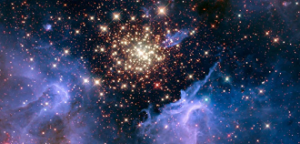 of the Being, in general and within certain contexts: “what is hidden within the whole, and from where the Being must emerge” that we elaborated there, this is what enchants the first images of the James Webb observatory, within the context of the universe, to look at great mysteries and phenomena there.
of the Being, in general and within certain contexts: “what is hidden within the whole, and from where the Being must emerge” that we elaborated there, this is what enchants the first images of the James Webb observatory, within the context of the universe, to look at great mysteries and phenomena there.
Leaving the occupation and entering the mystery is thus an expansion of the Being, when we discovered a new world at the end of the Middle Ages, a set of discoveries around science were also being illuminated and they too were the beginning of a clearing, but the close link to subjectivism, the path of a materialist objectivism had once again been hidden.
Pre-occupation, meaning what occupies our mind and, consequently, our act, develops in the whirlwind of modernity in a “society of Burnout”, where pre-occupation leads at the same time to mental and social exhaustion, and a lack of contemplation, that is, our inability to “admire and think about something” in a contemplative state.
Thus, it is only possible to leave pre-occupation through a process of clearing the Being, a plunge into the mystery, an ability to “put in parentheses” our thoughts and actions (the method of the phenomenological epoché), and thus return to “breathing” and leaving the toxicity of the modern world, we do not fail to analyze and observe the serious facts of contemporaneity.
Thus, the concealment, the mystification or false “mystification” of reality is opposite to the clearing, and very different from the occultism, the example of James Webb’s images and studies are a clear vision of this plunge into the mystery, where we can always find novelties and new enigmas. .
Pre-occupation is the sameness of the contemporary world, false problems and real problems hidden in discourses and addicted ways of seeing reality, like someone with vision difficulties and not subject to the use of glasses to clarify reality.
Contemplating is a complementary act with active life, and only it allows a unity of Being, where even in dark moments there is light and serenity.
The bridges of Königsberg and the paradox of war
The city Konigsberg (today Kaliningrad of Russia) was a 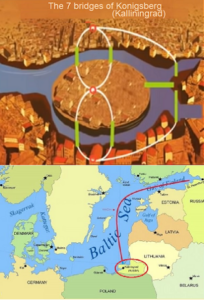 German city in East Prussia, after the second world war it lost possession to Russia, which sent settlers there, it had 7 bridges before the war and the inhabitants wondered if it was possible to a walk through all the bridges, passing once through all of them.
German city in East Prussia, after the second world war it lost possession to Russia, which sent settlers there, it had 7 bridges before the war and the inhabitants wondered if it was possible to a walk through all the bridges, passing once through all of them.
The problem was solved by Euler (who was Swiss) by building a mathematical model that was later called a graph, where nodes and edges connect, and which today is important to think about models of Social Networks (which are the relationships between nodes and that are not necessarily made by the media), and the fact of turning around the same node indicates a “social” relationship of two directions, in a certain sense, of reciprocity.
Euler proved that it was not possible to do the walk without crossing the same bridge twice, and in the graph drawing you can try to do this exercise and realize that in fact this is the answer.
The region that today belongs to Russia is a military base outside the Soviet Union, as Lithuania and Poland are on the way, and Belarus, although it is Russia’s military ally at the moment, although very close to Kaliningrad does not have a direct passage.
The war problem worsened when Russia carried out mock tests of nuclear-capable missiles on May 4, 2022, and Lithuania recently blocked trains crossing the country from Russia from passing through its territory, confiscating the goods.
Thus, the bridges that were previously destroyed for the passage of military weapons in the 2nd. World war, now break out in a dangerous scenario where broken social relations create a new paradox, as Kaliningrad is in practice the southernmost nuclear point and closest to countries such as Germany, the United Kingdom and France, and has a considerable nuclear arsenal in that ” oblast”.
Recently, a former general and now Russian deputy Andrey Gurulyov stated that the first target in a probable 3rd. War would be London and that global conflict arose from the Kaliningrad blockade.
Bridges are missing and walls are being built, experts say that war is unlikely, hopefully, the greatest paradox of a world war today will be the loss of a civilizational perspective.
Winter can be terrible for war
In a videoconference with the G7 in this Monday (06/27),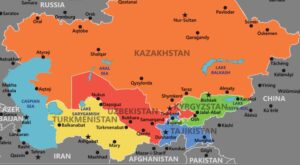 Ukrainian President Volodymyr Zelensky called for the war to cease until winter, always a harder period for troops and for regions at war, this indicates two concerns: an intensification of battles in autumn (in the southern hemisphere it is the spring, from September to December) and possible difficulties in the supply of gas and food in the period.
Ukrainian President Volodymyr Zelensky called for the war to cease until winter, always a harder period for troops and for regions at war, this indicates two concerns: an intensification of battles in autumn (in the southern hemisphere it is the spring, from September to December) and possible difficulties in the supply of gas and food in the period.
On the Russian side, the gas supply cut, which has an obvious financial sacrifice, could mean a collapse in heating systems, domestic and industrial use in the region.
The G7 meeting started Sunday (26/06) with the countries: USA, UK, Germany, Italy, Canada, France and Japan, and the videoconference was held on the 2nd. Fair (27/06), the president also denounced the Russian attack on a crowded mall in the Cremenchuk region, with more than a thousand people.
The battles are still tough in the Dombass region, although there is Russian advance, the cost in troops, armaments and morale has been high for both sides, in short, there is a growing hatred and a possibility of peace increasingly distant.
In a political effort, the president of Russia will make his first trip abroad visiting two former Soviet states: Turkmenistan and Tajikistan, and then he will still meet with Indonesian President Joko Widodo, there are no statements on the subject of the talks, but with It’s certainly a geopolitical issue (see map).
But behind this trip there is a more worrying objective, Putin’s concern with borders, in this case with the countries of Asia, indicates both nostalgia for the former Soviet Union and a long-term warlike concern, this has a dark outline for the future. of humanity.
Of course, there is no one-sided warmongering, also the NATO response has been harsh as Sweden and Finland officially hand over the request for entry into NATO, Moldova and Georgia is also preparing its entry, while Ukraine lives waiting for a late entry.
The scenario is extremely worrying for autumn in Eastern Europe, which is spring in the Southern Hemisphere, a growing concern about the supply of food and oil agitates the entire world, but the biggest nightmare is the war itself and its contours.
Few and heroic voices unite for peace (see our post), the concern about polarization is now worldwide.
The being between the break and the way
Two sentences of Heidegger’s well reflect his essential  questions that make more sense in moments of deep crisis: “We must raise again the question of the meaning of being” and “The human being is an ontologically privileged entity because in its existence its own is at stake”. being.” (in ‘Being and time’), then the path must start from a contemplative pause.
questions that make more sense in moments of deep crisis: “We must raise again the question of the meaning of being” and “The human being is an ontologically privileged entity because in its existence its own is at stake”. being.” (in ‘Being and time’), then the path must start from a contemplative pause.
The agenda is also a moment for the opening of being and an epoché about the meaning of existing, with other men, within a historical and solidary context with nature that is the “house” where it lives, while language is the abode of the human being. To be.
This requires a desert, a change of mentality, leaving the Fatigue Society, facing the pain and risks of a pandemic with another vision (Byung Chul Han wrote the Palliative Society) and finally finding peace in a new way, breaking with the structures of evil.
Only those who have passed through the desert, through the “valley of shadows”, which are now not exclusive to a single Being, but are shadows over the civilizing process around the world, including the possibility of war, hunger and an endless pandemic if we don’t change the posture.
The biblical story tells John the Baptist who went to the desert and announced a new time, which Christians celebrate his birth these days, Jesus also went to the desert where he was tempted and experienced hunger being fed by “angels”, and humanity as will cross your desert
To follow the path it is necessary to go through these questions, answer these questions, as the biblical passage says in (Lk 9, 20), Jesus after being rejected in Samaria and preventing the apostles from coming into conflict with that people, says to the having a disciple who wanted to bury his father: “Let the dead bury their dead, but you, go and announce the kingdom of God”.
This means that we should not look at what is dying, but at what is being born in the middle of the desert, because that is where a new path begins.
Peace also has protagonists
If war makes its “heroes”, peace makes its “heroes”, three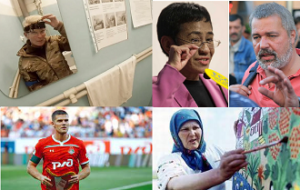 cases were reported last week: Russian journalist and Nobel Peace Prize winner Dmitry Muratov who is auctioning his medal for Ukrainian refugees, the former captain of the Russian football team Igor Demisov, midfielder said that I send a video to President Vladimir Putin in March asking him not to continue with the conflict and the last and most touching was the release of nurse Yuliia “Taira” Pavievska (photo 1), known like Taira, heroine of Ukraine in Mariupol where she also took care of Russian soldiers.
cases were reported last week: Russian journalist and Nobel Peace Prize winner Dmitry Muratov who is auctioning his medal for Ukrainian refugees, the former captain of the Russian football team Igor Demisov, midfielder said that I send a video to President Vladimir Putin in March asking him not to continue with the conflict and the last and most touching was the release of nurse Yuliia “Taira” Pavievska (photo 1), known like Taira, heroine of Ukraine in Mariupol where she also took care of Russian soldiers.
Taira had released a video with images of the “horrors” in Mariupol, and worked in precarious conditions of medicine and equipment, even so he also served the Russians.
Nobel laureate Dmitry Muratov, on the other hand, said that there is less and less independent press in his country, but that he already observes a growing distrust of the population around the war, Dimitry received the Nobel Peace Prize along with Filipino-American journalist Maria Ressa ( photo 2).
The footballer Igor Demisov (photo 3) said that he feared for his life after making his request for peace public, saying “I don’t know. They may arrest me or kill me for these words, but I say things as they are. I even told him: I’m willing to kneel before you”, even though he said he was proud.
The fourth photo is a painting by Maria Prymachenko (photo 4), about 25 works may be destroyed in the small old Ivankiv museum, on the outskirts of Kiev, she made drawings, painted pictures (photo 4) and did embroidery, Pablo Picasso considered her “brilliant” after seeing her works in Paris.
The lamentable statement by former Russian President Dmitry Medvedev, who expects the United States to beg for a discussion of nuclear weapons, and no less regrettable NATO declaration Jens Stoltenberg, that the war will be long, no breath for peace, no word of hope or dialogue.
Peaceful people never tire of asking for peace, the appeal to reason and dialogue, even if it is belated.
Being and the Imperishable
It was Justin Saint and Christian Martyr of the second century, who, meeting an Elder, who is in his book Dialogue with Trypho, he understood that it was God’s desire that the soul be immortal and this separated it from Platonism, a philosophical path that had traveled after the Stoics.
meeting an Elder, who is in his book Dialogue with Trypho, he understood that it was God’s desire that the soul be immortal and this separated it from Platonism, a philosophical path that had traveled after the Stoics.
Justin is the first in Christianity to deal with the problems of philosophy in a contemplative and philosophical way, his work was not systematic (Apology I and II), but fundamental to a philosophical path of Christian thought, and influenced many thinkers of patristics of early Christian times. .
For his Christian faith, Justin was denounced and beheaded.
Thus, something imperishable inhabits the Being and is essential to it, the simple contemplation and asceticism that does not contain this premise is incomplete, however the access to this truth depends on a stage of beatitudes, those that are in Matthew 5, I highlight 4 that are contextually (Mt 5,5-9): Blessed are the meek, for they will inherit the earth, Blessed are those who hunger and thirst for justice, for they will be filled, Blessed are the merciful, for they will obtain mercy, Blessed are the pure in heart, for they will see God, Blessed are the peacemakers, for they will be called children of God.
But all this is not imperative to reach an immediate access to the divine, eternity is timeless and in it time is differentiated, it is a Kairos, or a time on the divine clock.
And all this is not separate from everyday life, which contains an “Scent of Time” as proposed Byung Chul Han, a divine humanly lived in each action and thus is not separate from contemplation, but has a different cadence from pure and simple activism.
Christian following is deeper because it requires renunciation, it is not enough to find Jesus or the Divine, in Lk 9:23, the master himself taught: “Then Jesus said to everyone: “If anyone wants to follow me, let him deny himself and take your cross each day, and follow me. For whoever wants to save his life will lose it; and whoever loses his life for my sake, he will save it.”
And this is the hardest and most definitive lesson.
New tension pole: Taiwan
In the midst of the war in Ukraine, the battle of Severodonesk continues with Russian advance, which promises greater protection to the separatist republic of Donbass, with no prospects for agreement, a new pole of world tension involving the West and the socialist republics is heading towards Taiwan.
continues with Russian advance, which promises greater protection to the separatist republic of Donbass, with no prospects for agreement, a new pole of world tension involving the West and the socialist republics is heading towards Taiwan.
The attempt at tension between the People’s Republic of China, which is Mainland, and Taiwan, which is on the island of Taiwan, which has separated from China since the defeat of Chiang Kai Shek by the socialist supporters of Moa Tse Tung, is getting closer and closer.
Let’s understand history, founded in 1912, the Republic of China embraced a large part of Mainland China and Mongolia, at the end of the second world war with the surrender of Japan, the country annexed the islands of Formosa and Penghu (fishermen) to its jurisdiction, when the Kuomintang (KMT) lost the war to the communist party led by Mao Zedong in 1948, Chiang Kai-Shek’s government took refuge in Taipei, the capital of Taiwan, and founded the Republic in Taiwan.
China never accepted this separation, but Taiwan’s political and political parties, such as former presidents Lee Teng-hui and Chen Shui-bian, considered that there was no need for a formal declaration of independence, however this became controversial in front of countries in the UN.
UN resolution 2758 of 1971 expelled the Republic of China (Taiwan) and gave the seat to the People’s Republic of China which lost its membership in all intergovernmental organizations related to the United Nations, such as the International Court of Justice, where international rights are discussed.
But the vote on the resolution was not unanimous (pictured) and many countries want to recognize the Republic of China, which maintains its independence, being one of the four Asian tigers with a strong economy, especially in the part of microelectronics components.
The tension is enormous and the idea that the People’s Republic of China will attack Taiwan is almost certain.

